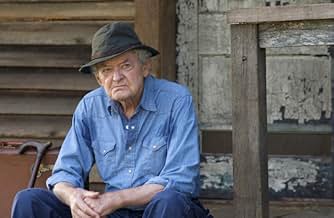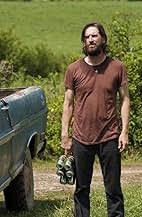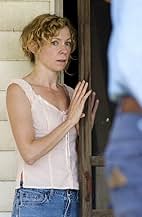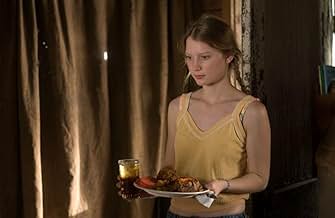IMDb RATING
7.0/10
3.1K
YOUR RATING
An aging Tennessee farmer returns to his homestead and must confront a family betrayal, the reappearance of an old enemy, and the loss of his farm.An aging Tennessee farmer returns to his homestead and must confront a family betrayal, the reappearance of an old enemy, and the loss of his farm.An aging Tennessee farmer returns to his homestead and must confront a family betrayal, the reappearance of an old enemy, and the loss of his farm.
- Awards
- 11 wins & 4 nominations total
Brian Edward Keith
- Deputy Keith
- (uncredited)
William J. Mode
- Deputy Davies
- (uncredited)
- Director
- Writers
- All cast & crew
- Production, box office & more at IMDbPro
Featured reviews
An aging Tennessee farmer returns to his homestead and must confront a family betrayal, the reappearance of an old enemy, and the loss of his farm.
This is the perfect example of how to write an old bull can against the young bull one. Holebrook's character doesn't want trouble, just his pride and the right to go on living the way he once did. He doesn't have much left, but pride. The movie does a great job of making us care for Holebrook, something that was hard to pull off consistently. Hal Holebrook is magnificent, and Oscar worthy here in his portrayal of Abner Meecham. It was hard to pull off, but Holebrook manages to maintain likability along with his grouchy, potentially off-putting role. There's never a moment where we don't sympathize with him, even when he pushes the limits, we manage to emphasize with his actions. I've not seen Holebrook perform a better role than this one. Ray McKinnon is excellent as the hot-shot antagonist, wanting to take over the farm. You'll hate him, and possibly even understand his actions in some cases. Walter Goggins is very good as the ungrateful son of Holebrook's, he did well.
Bottom line. The Sundance Film Festival struck gold with this one, and you will too. A must see
9 ½ 10
This is the perfect example of how to write an old bull can against the young bull one. Holebrook's character doesn't want trouble, just his pride and the right to go on living the way he once did. He doesn't have much left, but pride. The movie does a great job of making us care for Holebrook, something that was hard to pull off consistently. Hal Holebrook is magnificent, and Oscar worthy here in his portrayal of Abner Meecham. It was hard to pull off, but Holebrook manages to maintain likability along with his grouchy, potentially off-putting role. There's never a moment where we don't sympathize with him, even when he pushes the limits, we manage to emphasize with his actions. I've not seen Holebrook perform a better role than this one. Ray McKinnon is excellent as the hot-shot antagonist, wanting to take over the farm. You'll hate him, and possibly even understand his actions in some cases. Walter Goggins is very good as the ungrateful son of Holebrook's, he did well.
Bottom line. The Sundance Film Festival struck gold with this one, and you will too. A must see
9 ½ 10
There is a lot to recommend Scott Teems "That Evening Sun", and I'm happy I was able to catch a recent screening as a premier event of the Tallahassee Film Festival. Kindly indulge my regional preference for literature and the performing arts, but you really can't beat the local color of the rural South. This melancholy narrative is driven by simmering grudges,ill-gotten gains, and combustible relationships. It's as though William Faulker and Flannery O'Connor collaborated on Teem's script with its southern Gothic allusions and ironic events.
Hal Holbrook as the title character, Abner Meecham, is brilliant with his tenacious attitude, and wizened expressions. He may be old, but he's still capable, resourceful, and completely self-absorbed. Dream sequences and memories allow us to see his softer side as he relives tender moments with his late wife (played by the bewitching Dixie Carter, his real-life wife). He receives little support from his son, a busy attorney well-played by Walton Goggins. Their mutual disaffection is palpable and practically Shakespearean. Abner is not easy to love.
Abner's primary nemesis, Lonzo Choat, is a surly ne'er-do-well who relies as much on his monthly disability check as he does on cheap beer. Ray McKinnon gets a lot of mileage out of Choat's brutal nature and proprietary relationships. His rustic wife (Carrie Preston) and daughter (Mia Wasikowska) each exhibit individual strengths, but can't overcome the overarching power of Lonzo Choat.
Barry Corbin also lends a powerful performance as Abner's long-time neighbor and fellow octogenarian, Thurl Chessor. Abner and Thurl have known each other long enough that conversation is perfunctory, but comfortable. Neither wastes words nor breath, they are comfortable passing time without much fuss or muss, but not too much time lest they seem too dependent, too feminine.
"That Evening Sun" is beautifully shot capturing the simple bucolic beauty of rural Tennessee as kudzu slowly reclaims abandoned barns, and landscapes buzz with the heat and activity of hidden hives and birdsong. The soundtrack is a nod to depression-era country crooners, and Jimmie Rodgers adds the ideal poetic punctuation with his yearning yodels. I will see this one again.
Hal Holbrook as the title character, Abner Meecham, is brilliant with his tenacious attitude, and wizened expressions. He may be old, but he's still capable, resourceful, and completely self-absorbed. Dream sequences and memories allow us to see his softer side as he relives tender moments with his late wife (played by the bewitching Dixie Carter, his real-life wife). He receives little support from his son, a busy attorney well-played by Walton Goggins. Their mutual disaffection is palpable and practically Shakespearean. Abner is not easy to love.
Abner's primary nemesis, Lonzo Choat, is a surly ne'er-do-well who relies as much on his monthly disability check as he does on cheap beer. Ray McKinnon gets a lot of mileage out of Choat's brutal nature and proprietary relationships. His rustic wife (Carrie Preston) and daughter (Mia Wasikowska) each exhibit individual strengths, but can't overcome the overarching power of Lonzo Choat.
Barry Corbin also lends a powerful performance as Abner's long-time neighbor and fellow octogenarian, Thurl Chessor. Abner and Thurl have known each other long enough that conversation is perfunctory, but comfortable. Neither wastes words nor breath, they are comfortable passing time without much fuss or muss, but not too much time lest they seem too dependent, too feminine.
"That Evening Sun" is beautifully shot capturing the simple bucolic beauty of rural Tennessee as kudzu slowly reclaims abandoned barns, and landscapes buzz with the heat and activity of hidden hives and birdsong. The soundtrack is a nod to depression-era country crooners, and Jimmie Rodgers adds the ideal poetic punctuation with his yearning yodels. I will see this one again.
Based on the short story "I Hate to See That Evening Sun Go Down" by William Gay, "That Evening Sun" presents us with an epic battle of wills between two equally immutable forces fighting over the same piece of land. The property in question is a rundown farm in rural Tennessee owned by Abner Meecham (Hal Holbrooke), an octogenarian who's just walked away from the retirement home his son (Walter Goggins) placed him in after a serious fall a few months back. When Abner gets back to his farm, he is stunned to find that - thanks to a deal brokered by his lawyer son – the place has been signed over to a white-trash, ne'er-do-well by the name of Lonzo Choat (Ray McKinnon), who now lives there with his wife (Carrie Preston) and sixteen-year-old daughter (Mia Wasikowska), with whom Abner establishes an uneasy but generally tender relationship.
Scott Teem's screenplay is multi-faceted and complex in the way it develops its characters. For instance, many of the very same qualities that make Abner so appealing to the audience – his tenacity, his commitment to principle, his uncompromising willingness to call things as he sees them – are also what make him a hard person to deal with for those who are actually a part of his life. This is especially the case with his son, who though he obviously loves his father and wants to do right by him, harbors a lifelong resentment against the old man for his harsh treatment of both himself and his now-deceased mother while he was growing up.
To a somewhat lesser extent, Lonzo is also portrayed in a three-dimensional light. Though he is an alcoholic, a wastrel, and a man prone to acts of violence against both animals and members of his own family, there is a sense that he is genuinely trying to get his life together by earning an honest living and finally being a decent provider for his loved ones.
The movie really seems to understand the tragedy of old age – of feeling as if everything you ever called your own is now being taken away from you and nobody around you seems to care. In fact, many of those people – despite, in some cases, their possible good intentions - are proactively involved in bringing that outcome about. The movie also touches upon that root and highly American value of property ownership, and the willingness to stop at virtually nothing to ensure one's hold on one's land.
"That Evening Sun" is what is called in the trade an "actors' picture," and, indeed, it is the performances that are of primary interest here. Holbrooke has always been a tremendous actor, but here he is positively transcendent as Abner, a crusty old coot who is so much more than just a crusty old coot. Goggins, the brilliant star of "The Shield" and "Justified" and a co-producer of this film, is also excellent as Paul Meecham, a role quite different from the ones in the aforementioned works. And McKinnon, Preston ("True Blood"), and Wasikowska ("Alice in Wonderland," "The Kids are All Right") are all wonderful as well.
The tone of the film is contemplative and muted, and Teems' direction is rich in atmosphere and setting.
Scott Teem's screenplay is multi-faceted and complex in the way it develops its characters. For instance, many of the very same qualities that make Abner so appealing to the audience – his tenacity, his commitment to principle, his uncompromising willingness to call things as he sees them – are also what make him a hard person to deal with for those who are actually a part of his life. This is especially the case with his son, who though he obviously loves his father and wants to do right by him, harbors a lifelong resentment against the old man for his harsh treatment of both himself and his now-deceased mother while he was growing up.
To a somewhat lesser extent, Lonzo is also portrayed in a three-dimensional light. Though he is an alcoholic, a wastrel, and a man prone to acts of violence against both animals and members of his own family, there is a sense that he is genuinely trying to get his life together by earning an honest living and finally being a decent provider for his loved ones.
The movie really seems to understand the tragedy of old age – of feeling as if everything you ever called your own is now being taken away from you and nobody around you seems to care. In fact, many of those people – despite, in some cases, their possible good intentions - are proactively involved in bringing that outcome about. The movie also touches upon that root and highly American value of property ownership, and the willingness to stop at virtually nothing to ensure one's hold on one's land.
"That Evening Sun" is what is called in the trade an "actors' picture," and, indeed, it is the performances that are of primary interest here. Holbrooke has always been a tremendous actor, but here he is positively transcendent as Abner, a crusty old coot who is so much more than just a crusty old coot. Goggins, the brilliant star of "The Shield" and "Justified" and a co-producer of this film, is also excellent as Paul Meecham, a role quite different from the ones in the aforementioned works. And McKinnon, Preston ("True Blood"), and Wasikowska ("Alice in Wonderland," "The Kids are All Right") are all wonderful as well.
The tone of the film is contemplative and muted, and Teems' direction is rich in atmosphere and setting.
I've been looking forward to "That Evening Sun" for a while now, and not just because it was shot in the county and surrounding towns where I live here in Tennessee.
My anticipation was largely because of Hal Holbrook, an iconic performer I have seen in his one-man "Mark Twain Tonight!" stage show, and who appears in occasional guest shots on TV where things must move very fast, and less often in film, where things are allowed to proceed at a more measured pace.
I was not disappointed, the character study of Abner Meechum, the refugee from an old folks' home and renegade on his own property is rich, complex, and satisfying throughout. Admittedly it may not be a big stretch for Holbrook to play a cranky 80-year-old, but that doesn't lessen the impact of the performance at all.
Surrounding him is a cast of surprisingly strong players: the antagonist Lonzo Choat (Ray McKinnon) is an especially worthy and believable opponent, and supporting cast Pamela and Ludie Choat (Mia Wasikowska and Carrie Preston) likewise hit just the right notes, tugging this farm county family drama at precisely the right pace. I especially enjoyed Barry Corkin, perfect in the Wilfred Brimley-esquire good neighbor role, and a special mention for the cameo by Dixie Carter, Hal Holbrook's wife in the movie as well as in real life.
Where I saw the film, at a packed 1pm matinée, the audience laughed at several of the moments, self-reflective as they were of Tennessee rural life. I don't know that they would garner that kind of introspective appreciation in other parts of the country, but here, people know their country folk and can laugh with, rather than at them.
"That Evening Sun" is a simple yarn: Abner tires of life in a retirement home and returns to the farm he and his deceased wife occupied for most of their lives, only to find it occupied by a neer-do-well, but one with a property lease Abner's "guardian son" has approved. The story is more than the tug-of-war between owner and lessor, it is between hard-working- older and layabout younger, and between lives at noon and the sundown that inevitably follows. Taken from William Gay's short stories of Southern life, "I Hate To See That Evening Sun Go Down," it's the unraveling of a proud man in the twilight, as his own sun is setting, and his fight with the oncoming night.
Hal Holbrook is a treasure. So is this film. It's Indie with a capital "I", an armful of festival awards, and, one hopes, a long run ahead.
My anticipation was largely because of Hal Holbrook, an iconic performer I have seen in his one-man "Mark Twain Tonight!" stage show, and who appears in occasional guest shots on TV where things must move very fast, and less often in film, where things are allowed to proceed at a more measured pace.
I was not disappointed, the character study of Abner Meechum, the refugee from an old folks' home and renegade on his own property is rich, complex, and satisfying throughout. Admittedly it may not be a big stretch for Holbrook to play a cranky 80-year-old, but that doesn't lessen the impact of the performance at all.
Surrounding him is a cast of surprisingly strong players: the antagonist Lonzo Choat (Ray McKinnon) is an especially worthy and believable opponent, and supporting cast Pamela and Ludie Choat (Mia Wasikowska and Carrie Preston) likewise hit just the right notes, tugging this farm county family drama at precisely the right pace. I especially enjoyed Barry Corkin, perfect in the Wilfred Brimley-esquire good neighbor role, and a special mention for the cameo by Dixie Carter, Hal Holbrook's wife in the movie as well as in real life.
Where I saw the film, at a packed 1pm matinée, the audience laughed at several of the moments, self-reflective as they were of Tennessee rural life. I don't know that they would garner that kind of introspective appreciation in other parts of the country, but here, people know their country folk and can laugh with, rather than at them.
"That Evening Sun" is a simple yarn: Abner tires of life in a retirement home and returns to the farm he and his deceased wife occupied for most of their lives, only to find it occupied by a neer-do-well, but one with a property lease Abner's "guardian son" has approved. The story is more than the tug-of-war between owner and lessor, it is between hard-working- older and layabout younger, and between lives at noon and the sundown that inevitably follows. Taken from William Gay's short stories of Southern life, "I Hate To See That Evening Sun Go Down," it's the unraveling of a proud man in the twilight, as his own sun is setting, and his fight with the oncoming night.
Hal Holbrook is a treasure. So is this film. It's Indie with a capital "I", an armful of festival awards, and, one hopes, a long run ahead.
Abner Meecham,who has been living in a nursing home,is unhappy & wants to live out his final days on the farm land where he had made his living for over 50 years. One day,he packs his things & just walks away from it all. Despite a first failure (where he is picked up by the police & returned back to the home),Abner,undaunted tries again,this time getting further,with the help of a taxi cab driver,to his old farm land. Problem is,the land & the house are now leased by Lonzo Choat,who Abner doesn't like,one bit. Abner takes up in the workers quarters,just off the main house,much to the chagrin of Lonzo, who wants Abner off of his property,a.s.a.p. The following makes for a tense tale,that you know is going to end up badly. Scott Teem ('A Death In The Woods','Roots') directs & writes the screenplay,adapted from the novel, 'I Hate To See The Evening Sun Go Down',by William Gay (the title of which is taken from a line in an old country blues song by Jimmy Rogers). This is a quiet little independent film that in the wrong hands would have turned out to be just another Southern exploitation film (like the kind of films produced by Harry Novak that used to play drive in's back in the 1970's that stereotyped all of the citizens of the South as back woods,slack jawed,inbred,boozing,village idiots that would have sex with farm animals,or family members,or all of the above),but rises above that. The great Hal Holbrook (forever known for his portrayal of Mark Twain on stage & screen)plays Abner,a man who just wants what is rightly his. Ray McKinnon is Lonzo,a man who is just dripping with contempt for Abner. The rest of the cast (unknown by yours truly)turn in shining roles on screen. This is a quiet,little "indie" that drew acclaim at the festivals,but probably won't get much in the way of main steam distribution (I got to see it at one of our cinemas that specializes in foreign & art films),but deserves better. Rated PG-13 by the MPAA,it contains some raunchy language,an unpleasant scene of domestic abuse & some minor adult content.
Did you know
- TriviaDixie Carter's final film appearance.
- Quotes
Abner Meecham: Ha! Folks in hell will be eating Eskimo Pies before Lonzo Choat hauls me anywhere.
- How long is That Evening Sun?Powered by Alexa
Details
- Release date
- Country of origin
- Official site
- Language
- Also known as
- I Hate to See That Evening Sun Go Down
- Filming locations
- Production companies
- See more company credits at IMDbPro
Box office
- Gross US & Canada
- $281,350
- Opening weekend US & Canada
- $7,330
- Nov 8, 2009
- Gross worldwide
- $281,350
- Runtime
- 1h 49m(109 min)
- Color
- Sound mix
- Aspect ratio
- 2.35 : 1
Contribute to this page
Suggest an edit or add missing content



















